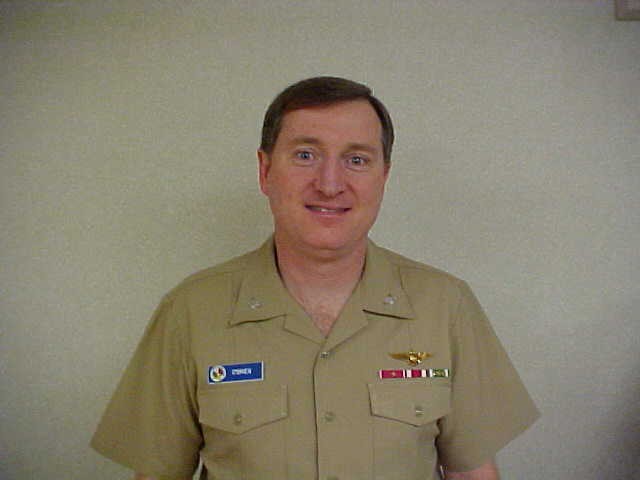O'Brien, Stephen CAPT
9/11 Pentagon Attack Oral History
“…all I ever was concerned with was…doing our best to identify as quickly as possible the remains and letting the families know so we can get them shipped home and get closure to their loved one. That’s it. That’s all we wanted to do."
Date of Interview: 15 November 2001
Interviewers: CAPT Gary Hall; CAPT Michael McDaniel; CDR Carol O’Hagan; CDR Karen Loftus; YNCS Kathleen Wright; & LNC Jeffrey Luthi, USNR, Navy Combat Documentation Detachment 206
At the time of the attack, CAPT O’Brien was serving in a reserve position as the Deputy for Mission Effectiveness at Navy Reserve Readiness Command (REDCOM) Mid-Atlantic. On the morning of the attack, he was working at the Washington Navy Yard.

Oral History Summary:
Late in the afternoon on 11 September, CAPT O’Brien was thinking about the force protection that would be necessary at all of the reserve centers throughout the country. He’d offered his help in any way he could be useful to the deputy commander of REDCOM Mid-Atlantic. While he was thinking about ways he could work the force protection issue, the deputy commander was in a meeting with Admiral Weaver, the Commandant of Naval District Washington (NDW). Admiral Weaver wanted to set up a Navy Liaison office at Dover Port Mortuary, which is where all of the remains from the attack on the Pentagon were going to be processed. Weaver had concerns because of the manner in which the casualties from the USS COLE bombing the year before had been handled. The deputy commander nominated CAPT O’Brien to lead the efforts to establish the liaison office.
CAPT O’Brien reported to Dover on Friday 14 September. He quickly met the two other members of the newly formed liaison office, CMDCM Gale Bond and PN1 Prince Brown, both assigned from their postings in PERS-6. The random assignment of CAPT O’Brien, CMDCM Bond, and PN1 Brown would end up working out incredibly well. From the start, even though none of them had any been given any instructions, guidance, or even basic office supplies, the three proved to be a formidable team. Working together, CAPT O’Brien and the other two members of the team established a strong presence at the mortuary. They held fast against any resistance they faced from the mortuary staff and Navy personnel who took issue with their decisions. They were able to do so, because they all shared the same values and beliefs, chiefly that the work they were doing was for the families of the victims. CAPT O’Brien recognized that his position in a station at the mortuary gave him a unique perspective on what each family needed and what the liaison team could do to ensure those needs were met.
In his oral history, CAPT O’Brien spoke candidly about the experiences he had working at Dover. On numerous occasions, he spoke highly of CMDCM Bond and PN1 Brown and the work they accomplished together. He also spoke in detail about everything he had learned throughout the process. CAPT O’Brien praised the CACOs who served as the main interface between the families and the Navy. At the same time, he pointed out numerous occasions where the CACO system of communication and operations failed. He spoke openly too about the competing interests of different Navy commands and failures in communications amongst those commands that often threatened to overturn all the work he did at Dover with CMDCM Bond and PN1 Brown. In many ways, his oral history is a lessons learned. Towards the end, CAPT O’Brien provided meaningful details on his beliefs on death and the meaning it gives to life. As he explained, his beliefs gave him a healthier perspective on the attacks and helped him understand the reasons why he ended up in his position at Dover. Here too he provided meaningful lessons.
Content Warnings: Sensitive Content
Oral History Abstract and Transcript: O'Brien, Stephen CAPT November 2001 Pentagon Attack Oral History (PDF, 606kb)
Related Oral Histories:
Additional Materials:
After Action Report: Navy Liaison Office at Dover Port Mortuary, 23 January 2002 (PDF, 489kb)


